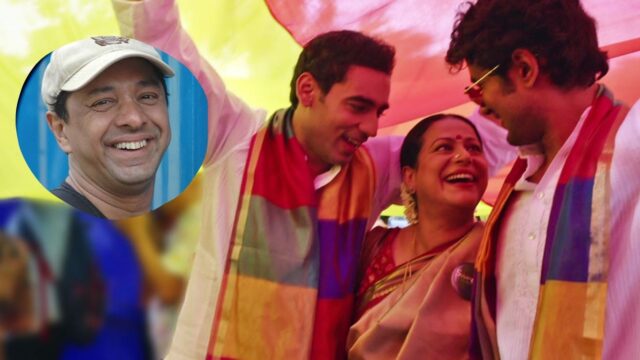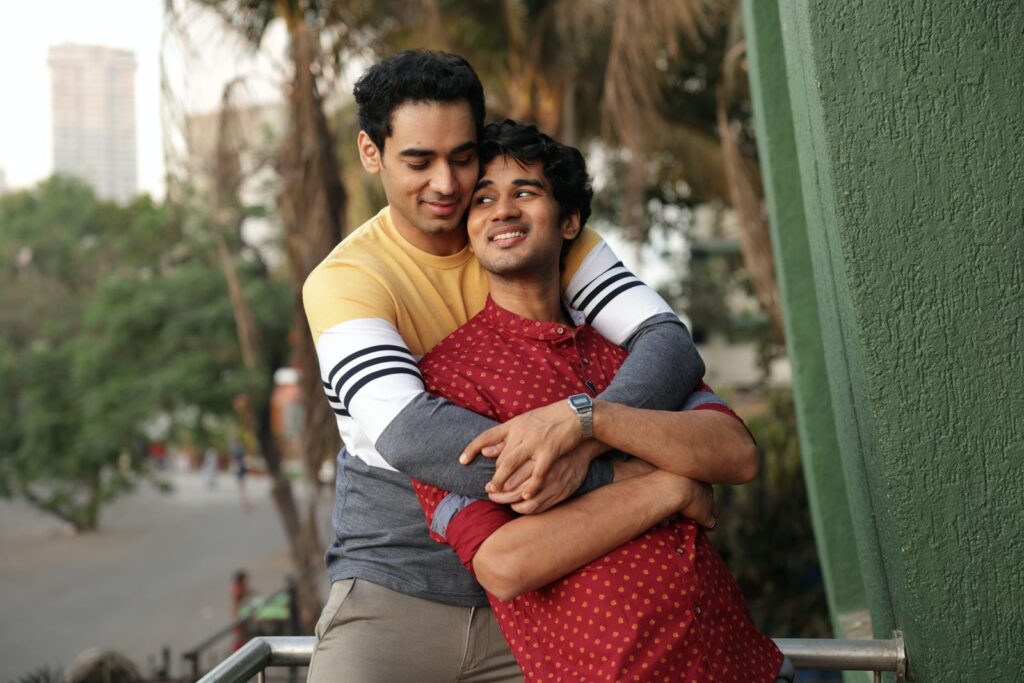
Filmmaker Sridhar Rangayan has dedicated his career to bringing authentic LGBTQIA+ narratives to Indian cinema. As the founder and Festival Director of KASHISH Pride Film Festival, he has championed queer representation in mainstream media. His latest Hindi feature titled Kuch Sapney Apne, co-directed with Saagar Gupta, is set for a theatrical release on February 21, 2025. The film stars Mona Ambegaonkar, Shishir Sharma, Satvik Bhatia, Arpit Chaudhary, and Abhay Kulkarni among others. In an exclusive interview with The Movie Mail, Rangayan discusses the challenges of showcasing queer narratives in cinema, audience acceptance, and the evolution of LGBTQIA+ representation in India.
Edited excerpts below:
Your film is soon to hit the theatres. Isn’t it difficult to release such sensitive films theatrically?
A. This film is made for a mainstream audience. It has three love songs, and though it is a love story between a gay couple, the treatment is as mainstream as possible. Despite limited resources, we shot in stunning locations. Our cinematographer, Shubranshu Das, beautifully captured places like Stockholm, Sweden, a picturesque riverfront near Mysuru in South India, and parts of Mumbai. The visual spectrum is worth experiencing on the big screen.
Also, the film received an overwhelmingly positive response at International film festivals. People appreciated its aesthetics, and a theatrical release allows audiences to immerse themselves in that visual experience. Moreover, these days, a theatrical release is mandatory before an OTT release. Having said that, we believe in our film’s content, and we are confident that audiences will connect with the story.
Back in 2019, we released Evening Shadows theatrically with 17 shows. This time, we are being more ambitious—releasing the film in 17 cities, across three theatres, for at least a one-week run. Of course, it will release on OTT later, but I remain hopeful that audiences will embrace it on the big screen first.
Independent films—especially queer love stories—face challenges at the box office. Do you think success metrics should be redefined for such films?
A. Absolutely! Making a film with passion is one thing; cinema as a business is another. The distribution system is not structured in favour of independent filmmakers, not just in India but globally. Investment must be recovered—that’s a basic necessity. And from my 30 years of experience, I can tell you, it’s even tougher when the film focuses on a queer love story.
OTT platforms, which were once a great support for indie films, are now prioritizing the star system. However, I’m hopeful that our film will land on a strong OTT platform, just as we did with our previous projects.

Young audiences are more open to queer love stories, but mostly on OTT. A theatrical release caters to families as well. Are older generations ready for such content?
A. Our film has a U/A certificate with a 16+ rating, which means kids between 10 to 16 can watch it with parental guidance. It is a family-friendly film. I love that younger audiences are more open-minded, but I urge them—If you support LGBTQ+ representation, buy a ticket and fill theatre seats. Box office collections matter. If we don’t recover costs, making more films like this becomes difficult. These days, college students spend a lot on fancy coffee—why not invest in a ticket for meaningful cinema? (laughs)
Many A-list Bollywood celebrities advocate for LGBTQ+ rights but not a lot of them have played queer roles on-screen. Do you see hypocrisy in this?
A. You’re right—barring Sonam Kapoor, no A-lister has played a queer character in mainstream Bollywood. But I wouldn’t call it hypocrisy. Many genuinely believe in equal rights but must also maintain their star image. Playing a gay character still comes with societal perceptions.
That said, things are changing. Films like Shubh Mangal Zyada Saavdhan and Badhaai Do featured Ayushmann Khurrana and Rajkummar Rao playing gay characters in mainstream settings. Rajkummar, now a star, helped elevate the conversation.
South Indian cinema is relatively less rigid about image—Vijay Sethupathi, a mainstream superstar, played a transgender woman in Super Deluxe. Mammootty played a gay character in Bhootham. When these films succeed, producers invest in similar stories. So, ultimately, audiences must take responsibility—support these films so that more get made!
What inspired you to make this film?
A. It’s actually a spin-off from Evening Shadows. After its release, audiences kept asking what happened to the characters. Kuch Sapney Apne picks up seven years later, exploring their journey, parental dynamics, and societal pressures.
Beyond the queer love story, the film also celebrates female empowerment—addressing second marriages, social taboos, and personal liberation. I’m a feminist, and I wanted to showcase strong, empowered women. But no spoilers—the audience must watch it in theatres.
You’ve been organizing the KASHISH Film Festival for years. What changes have you observed?
A. Initially, even LGBTQ+ attendees were wary of media exposure, fearing judgment. KASHISH became a safe space. Over time, we conducted audience surveys—out of 2000 attendees, 70% were from the community, while the rest included families, allies, and general film lovers. The growing participation of non-LGBTQ+ audiences signals positive change. Cinema is a powerful tool for inclusivity, and I see hope.
The society is evolving, but coming out is still difficult. As someone in your 60s, how was your experience coming out decades ago?
A. (pauses) It was a different time. We weren’t even called ‘gay’ respectfully—people used slurs. I was a late bloomer, raised in Karnataka in a traditional South Indian family. Even in IIT Mumbai, I remained closeted. Back then, intimacy happened in secrecy—there was no openness, not even with the person you loved.
Everything changed when I discovered Bombay Dost, India’s first gay magazine. A friend introduced me to it, and I finally saw my experiences reflected in its pages. That’s when I knew I had to come out. I wanted to be a visible, positive image for the community, and eventually, I started making films on the LGBTQ+ community with the right representation.
I came out to my mother in 1994 when I introduced her to my partner Saagar. We are together for last 30 years now. It took her seven years to accept it! She liked him as a person but struggled with the idea of us as a couple. Her generation was far more orthodox.
What advice would you give parents whose children are struggling to come out?
A. Listen to your child. Your child is special, and their sexual orientation does not change that. You raised them with love—don’t let societal opinions dictate your relationship with them. I also tell young people to have open conversations with their parents. Older generations need time to understand. But ultimately, they love you, and they will accept you—just give them the time and space to do so.














